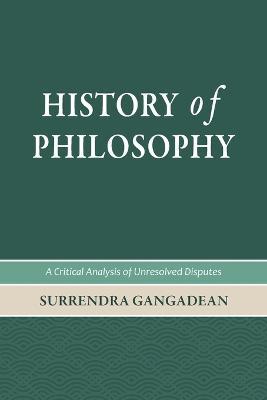History of Philosophy: A Critical Analysis of Unresolved Disputes

History of Philosophy: A Critical Analysis of Unresolved Disputes
The history of philosophy is beset by unresolved disputes. These disputes are passed down from generation to generation as problems to be solved. If not solved, they engender skepticism. Philosophical disputes, posed as problems, can be resolved or dissolved if we first acknowledge that some things are clear to reason. Philosophical problems are about beliefs. There are more basic and less basic beliefs. All philosophical problems can be resolved by critical analysis of basic beliefs. What is basic is clear to reason. Basic beliefs are about God and man and good and evil. A historical, critical analysis of philosophical problems reveals what a thinker believes about reason, God, man, and the good for man. Not all basic beliefs are coherent when tested by the critical use of reason. A critical analysis of basic beliefs should lead us to see what is clear.
In History of Philosophy, Dr. Gangadean critically examines what several prominent philosophers have said about what is basic and clear. He considers how and why they differed from others and what influences they had. Among the philosophers examined are the views of the Presocratics, Plato and Aristotle, Nagarjuna and Buddhist philosophy, Augustine (and Augustinians such as John Calvin and Alvin Plantinga), Shankara and Advaita Vedanta philosophy, Ramanuja and Dvaita Vedanta philosophy, Thomas Aquinas, Rationalism (including Rene Descartes, Baruch Spinoza, and Gottfried Leibniz), Empiricism (including John Locke, George Berkeley, and David Hume), Immanuel Kant, Georg Hegel, Existentialism (including Soren Kierkegaard, Friedrich Nietzsche, Jean-Paul Sartre, and Albert Camus), Postmodernism, and Critical Theory. The author confines himself to what each says about what is basic-about the possibility of knowledge, what is reason, what is real, and what is the good. In doing so, he hopes to make it clear that disputes arise from unexamined basic beliefs and that, upon examination, the truth about what is basic is clear.
PRP: 165.25 Lei
Acesta este Prețul Recomandat de Producător. Prețul de vânzare al produsului este afișat mai jos.
148.72Lei
148.72Lei
165.25 LeiLivrare in 2-4 saptamani
Descrierea produsului
The history of philosophy is beset by unresolved disputes. These disputes are passed down from generation to generation as problems to be solved. If not solved, they engender skepticism. Philosophical disputes, posed as problems, can be resolved or dissolved if we first acknowledge that some things are clear to reason. Philosophical problems are about beliefs. There are more basic and less basic beliefs. All philosophical problems can be resolved by critical analysis of basic beliefs. What is basic is clear to reason. Basic beliefs are about God and man and good and evil. A historical, critical analysis of philosophical problems reveals what a thinker believes about reason, God, man, and the good for man. Not all basic beliefs are coherent when tested by the critical use of reason. A critical analysis of basic beliefs should lead us to see what is clear.
In History of Philosophy, Dr. Gangadean critically examines what several prominent philosophers have said about what is basic and clear. He considers how and why they differed from others and what influences they had. Among the philosophers examined are the views of the Presocratics, Plato and Aristotle, Nagarjuna and Buddhist philosophy, Augustine (and Augustinians such as John Calvin and Alvin Plantinga), Shankara and Advaita Vedanta philosophy, Ramanuja and Dvaita Vedanta philosophy, Thomas Aquinas, Rationalism (including Rene Descartes, Baruch Spinoza, and Gottfried Leibniz), Empiricism (including John Locke, George Berkeley, and David Hume), Immanuel Kant, Georg Hegel, Existentialism (including Soren Kierkegaard, Friedrich Nietzsche, Jean-Paul Sartre, and Albert Camus), Postmodernism, and Critical Theory. The author confines himself to what each says about what is basic-about the possibility of knowledge, what is reason, what is real, and what is the good. In doing so, he hopes to make it clear that disputes arise from unexamined basic beliefs and that, upon examination, the truth about what is basic is clear.
Detaliile produsului










